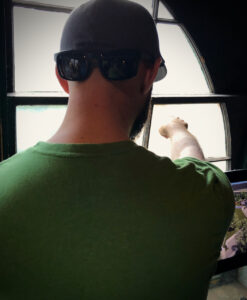
A man sights out the window at the Texas Schoolbook Depository, Dallas. Photo by John Griswold.
I would bet that at least once every day of the week (except Monday and Tuesday), there is a young guy with a beard and wraparound shades on the back of his ball cap, or an older guy with a T-shirt that says something like, “For those I love I will do great and terrible things,” who, finding himself standing at a window on the sixth floor of the Texas Schoolbook Depository in Dallas, will look down at the two X-shaped gouges in the asphalt on Elm Street and line up his shot. They did the day I visited recently.
The old warehouse is owned by Dallas County now, and once you are there it might seem odd that as a locus of political violence it was not razed for the same reason Bin Laden and Hitler have no graves. At least Ford’s Theatre is also a theater, and the Winter Palace is magnificent. But maybe people go to those places too with a sense of wonderment that unexceptional, angry people can do things to destroy an entire system and force new beginnings.
In any case, the nonprofit museum on the Depository’s sixth and seventh floors, run by the Dallas County Historical Foundation, is #1 on Tripadvisor’s 2022 “Top Attractions in Dallas,” placing it above the Arboretum, Reunion Tower, George W. Bush Presidential Library and Museum, Perot Museum of Nature and Science, and Museum of Art.
Obviously the event still holds a seat in our imagination, and the building is all that is left of it where it happened. Workaday but fully vested with historical importance, its displays teach what is known but must acknowledge the problems of certainty, and how in certain times, such as our own, those slide off into conspiracy theories, lies, and violence. The building is a place where bullets trumped schoolbooks in significance, and visitors participate in its immersive quality.
On the sixth floor, visitors walk somberly around exhibits, take time to read signs and watch short videos, visibly mourn, and wonder aloud what might have been. But the shooter’s corner is behind glass, like a shrine, and little monitors under the other windows play an animation of the motorcade making the turn. It shows the missed shot, the wounding shot, and the fatal shot. The quality is that of an old video game, and in fact might have been from the first-person shooter game someone made tastelessly of the assassination.
Hustlers on the adjacent grassy knoll sell self-published books with gory photos in them and poor-quality videos that purport to tell the real story that scholarly histories in the museum gift shop get all wrong.
Has there ever been a more American memorial?
It is tempting to take the view of an older generation. My mother loved the idea of the Kennedys—the vigor of family football on the lawn; the heroism and lasting disability from PT-109; a president with a sense of humor and a First Lady who insists André Malraux visit the White House. Camelot was prelapsarian to my mother.
But the truth is, the US was always also Nixon nursing his gripes and biding his time; Dallas was the “City of Hate,” due in part to inflammatory partisan media, when Kennedy arrived at Love Field; and Robert F. Kennedy Jr., who looks so like his father and is concerned for the environment, is one of the country’s worst propagandizers of vaccine misinformation.
As they kept saying at CPAC—my reason for being in Dallas—we hope to be a shining city on the hill. It only has a hope of working if we act that way, but we must admit we often do not want to act that way. (“We are all domestic terrorists” was the title of one CPAC session.)
Outside the Schoolbook Depository, cars swerved around the two X’s on Elm that mark where the occupants of the limousine were shot, as if doing so would protect their drivers—and maybe the X’s, in order to keep them fresh.
